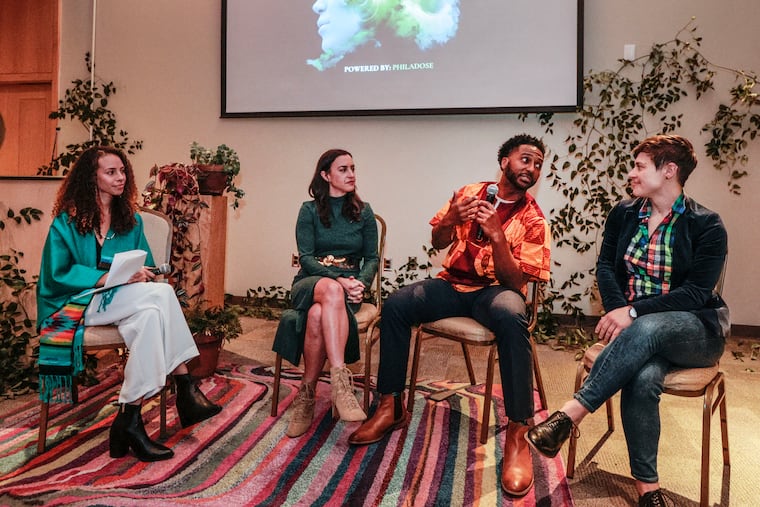Philadose conference highlights psychedelic therapies in Pennsylvania
Therapists who work with ketamine say they’re navigating a fast-growing industry to treat patients with severe depression that hasn’t responded to other treatment.

An Air Force veteran from Lancaster struggling with PTSD found hope in psychedelic drugs — specifically, mushrooms — after nothing else would help.
A Philadelphia music therapist who first experimented with psychedelics recreationally is now training to use them in sessions.
They and other attendees of the first-of-its-kind Philadelphia Psychedelic Summit on Wednesday evening shared stories and tips for navigating a fast-growing industry seeking to treat patients with severe depression that hasn’t responded to other forms of treatment with hallucinogenic drugs that can alter people’s senses and perceptions. While the legal status of psychedelic drugs varies by state, mental health professionals increasingly see promise in the therapeutic benefits of a more supervised experience.
“We’re really at a changing point in history, where these medicines are starting to become decriminalized and legalized,” Aubrey Howard, the cofounder of the psychedelic advocacy group Philadose, which organized the summit, told a few hundred people who attended the event at the Independence Visitor Center.
Psychedelic drugs are not legal in Pennsylvania, but some psychiatrists prescribe ketamine, a legal drug that produces similar effects off-label to treat depression. Ketamine is more commonly used as an anaesthetic. A ketamine derivative, esketamine, has been approved by the Food and Drug Administration in the form of a nasal spray, specifically to treat depression.
Last year, Pennsylvania legislators on both sides of the aisle introduced a bill that would allow the state Department of Health to fund research into mushrooms for therapeutic use.
Two states, Oregon and Colorado, have legalized the use of some psychedelic drugs, with Colorado voters approving a ballot measure just two weeks ago. By 2024, both states will allow people to take psychedelic drugs under supervision at licensed “healing centers.”
Still, skeptics have cited ketamine’s use as a recreational club drug while pushing back against more widespread use, and some observers worry that a lack of regulation around prescribing it off-label has encouraged some ketamine clinics to oversell its benefits, or to offer the drug without the supervision of a mental health professional, as a STAT investigation found in 2018.
Ron Millward, an Air Force veteran from Lancaster and the founder of Balanced Veterans, a nonprofit that helps veterans suffering from post-traumatic stress disorder, said he developed PTSD himself after a combat tour in Iraq in 2010.
He’s lost more than a dozen friends to suicide, he said. To deal with his own PTSD, he turned to cannabis, and then to mushrooms, after feeling dissatisfied by more traditional pharmaceutical drugs.
“I was almost a statistic myself,” Millward said, referring to high suicide rates among veterans. “But psychedelics really changed my life, and I’m forever grateful.”
The legal psychedelic treatment: Ketamine
Therapists who spoke Wednesday said they’ve seen patients benefit from ketamine treatments. There’s also research that supports the idea.
For example, a 2021 study looking at 156 French patients admitted to hospitals for suicidal intentions found that 63% of patients treated with a ketamine injection stopped having suicidal ideas within three days, compared with 31.6% in those given a placebo. Another study found patients who took esketamine nasal spray and an antidepressant were more likely to come out of depression compared with those who took just an antidepressant.
Demeko Freeman, a music therapist who’s studying psychedelic-assisted therapy, said he, like Jones, was first introduced to psychedelics recreationally. Years later, training as a therapist, he came to realize the benefit that psychedelics might have in his therapy practice.
“When we experience psychedelics for ourselves, we think that everyone in the world should experience psychedelics,’” he said, laughing. But it’s important, he said, not to press anyone to try such treatments.
Speakers at Philadose stressed that ketamine therapy by necessity includes ongoing mental health support and isn’t a cure-all, nor suited to everyone. A responsible clinician will screen patients thoroughly before recommending ketamine and carefully monitor them during and after therapy.
» READ MORE: What is a ketamine therapy session like? A Philly-based therapist explains her process
Open-mic testimonials
In an open-mic audience session, attendees talked about how meaningful their own psychedelic experiences had been — helping them deal with intense heartbreak, or better understand a goal in life.
Attendees and speakers said that as interest grows in psychedelic therapies, they’re concerned that further commercial interest in psychedelics will make it difficult for people to access what can already be an expensive form of treatment — especially for people who come from cultures with a history of psychedelic traditions.
“A lot of the ways we practice this work come from Black and Indigenous communities around the world,” said Jess Jones, a licensed clinical social worker who offers ketamine-assisted therapy to patients at her clinic in the Ludlow section of North Philadelphia, just north of Northern Liberties.
Howard, the event’s organizer, said she’s excited to continue hosting discussions about psychedelic therapy. “We’re just catching up,” she said. “Research was banned, for so many years.”